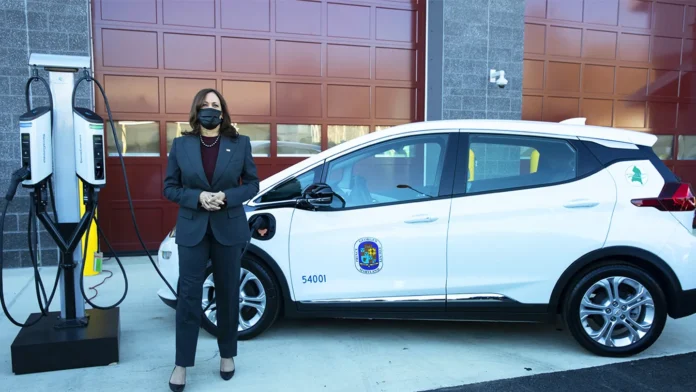Vice President Harris regularly claims that if elected, she will create a “strong middle class,” despite the fact that the Biden administration advocates for an electric vehicle requirement, which one economist claims is out of line with most middle-income Americans.
“I believe we need to grow our middle class and make sure our economy works for everyone, for people like the people in the neighborhood where I grew up and the hardworking Americans I meet every day across our nation,” Harris told reporters during a September campaign event. “When we invest in those things that strengthen the middle class – manufacturing, housing, health care, education, small businesses, and our communities – we grow our economy and catalyze the entire country to succeed.”
After becoming the Democratic presidential nominee, Harris stated that she does not support mandating electric automobiles. However, the Biden-Harris administration is currently proposing one that, according to one economist, is impractical for the middle class.
“We know from the facts that middle-class individuals are rejecting electric vehicles. There are numerous reasons why this is happening, and why the trend towards EVs is altering, one of which is cost. Stephen Moore, an economist and senior visiting fellow at the Heritage Foundation, told Fox News Digital that these cars cost $80,000.
The Environmental Protection Agency (EPA) issued a final rule in March under the Clean Air Act establishing new pollution limits that would require up to two-thirds of new automobile sales to be electric by 2032. The new rules would apply to “light-duty vehicle manufacturers, independent commercial importers, alternative fuel converters, and medium-duty vehicle manufacturers and converters,” according to the EPA’s final rule.
The rule provides a tax credit of up to $7,500 for eligible purchases, but Moore claims that even with the credit, EVs are “still out of [middle-class Americans’] price range.”
“The idea that you’re going to force people to buy $75-, $80- $90,000 cars is going to mean a lot of Americans won’t be able to afford to buy a car if you continue with these mandates,” according to him.
Moore went on to say that the Biden-Harris administration mandate, which the House voted down in September, would make it impossible for middle-class families to purchase a car.
“The majority of middle-class people cannot afford EVs. They have these mandates that say 65% of cars will be EVs by 2030, yet there are barely half as many people who want to buy EVS. That implies there will be a shortage of gas-powered vehicles, which are affordable to middle-class families,” Moore stated in an interview with Fox News Digital.
Kelley Blue Book, a vehicle assessment agency, estimates that the average electric vehicle will cost more than $56,000 by September 2024.
According to the United States Census Bureau’s Federal Reserve Economic Data (FRED), the average middle-class American earns two-thirds or more than the median national household income of $80,610. Given the present median, middle-class income spans between $53,000 to $160,000.
According to a Capital One price analysis on electric vehicles, EV purchases are “out of reach of anyone bringing home less than about $120,000 per year,” removing the vast majority of the middle class from eligibility based on the US Census Bureau’s FRED average.
According to recent surveys, the majority of middle-class Americans are not interested in purchasing an electric vehicle right now.
According to a Gallup poll conducted in April, only 5% of middle-income Americans possess an electric vehicle, and 44% would not consider purchasing one. Pew Research conducted additional polling in June, and found that three in ten Americans would seriously consider purchasing an electric vehicle.
“Why are EVs practical for everyone (not just the middle class)? They provide a superior driving experience. “They are quieter, smoother, and have far superior acceleration,” said John Higham, chairman of the Electric Vehicle Association Board of Directors.
Higham identified charging as one of the primary reasons why not every household is ready for an electric vehicle.
“I believe that most importantly, EVs can be more cheap to drive. Note that I said “can be.” They can also be more expensive to drive, and I see a lot of math geared toward demonstrating the latter rather than the former,” Higham told Fox News Digital. “So, if EVs are more enjoyable to drive and less expensive than gasoline-powered vehicles, why aren’t they available to everyone? It comes down to charging. If you can charge at home, you’re probably a strong candidate for an EV. If not, very likely not.”
